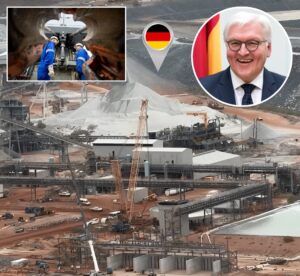A German Lithium Discovery That Could Redefine Europe’s Future
In SAXONY, Germany, a discovery below the rolling hills of eastern Germany may soon shift the balance of power in Europe’s clean energy future. UK-based Neptune Energy has announced the uncovering of a massive 43-million-ton lithium deposit in Saxony, which is the largest ever found, and it is valued at over $1 trillion.
The find could power more than 800,000 electric vehicles and marks a turning point for Europe’s struggle to secure critical raw materials for its green transition. Once a site for natural gas extraction, the region may now become the heart of Germany’s electric vehicle revolution.

For families in Saxony, a region long associated with coal and heavy industry, the lithium boom promises jobs, renewed local pride, and generational change. Communities that once relied on fossil fuels could soon become part of a cleaner, more sustainable energy story. This will be a emblematic and economic revival for an area often left behind by globalization.
Europe’s Lithium Lifeline; The discovery arrives at a politically charged moment. With China currently dominating lithium refining and battery production, Europe’s dependence on imports has been a strategic vulnerability. Neptune Energy’s CEO, Andreas Scheck, hailed the find as a “major contribution to European energy security,” potentially insulating the EU from supply shocks and geopolitical pressures.
If fully developed, Germany could transition from lithium importer to continental supplier, bolstering its ambitions for energy sovereignty and industrial competitiveness.
Beyond economics, the discovery may reshape public attitudes toward mining and environmental responsibility. Lithium extraction raises ecological questions about groundwater use, biodiversity and land rehabilitation, which can be issues that will test Germany’s balance between progress and preservation. Yet, it also reinforces a shared European narrative: that of innovation, resilience, and sustainability rooted in local communities.

A new chapter for European industry. Much more for automakers like BMW, Mercedes-Benz, and Volkswagen, the Saxony deposit could ease the scramble for battery materials and accelerate plans to electrify entire fleets. A domestic supply of lithium could make European EVs cheaper, cleaner, and more competitive on the global stage.
The implications stretch far beyond business. This find could mark the beginning of Europe’s energy independence, a pivot away from extractive dependence and toward a future powered by its own ground and ambition.








